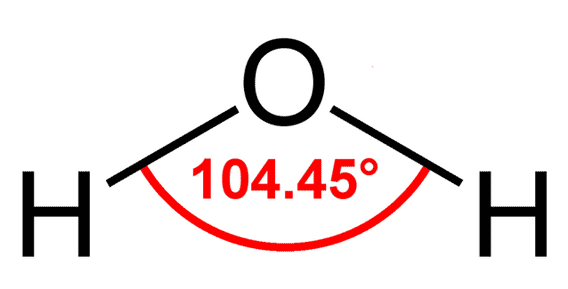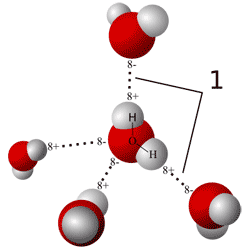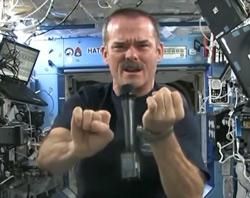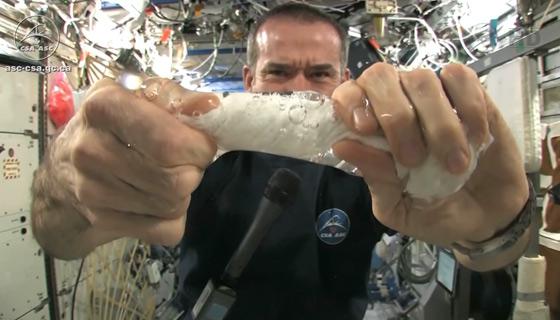Commander Chris Hadfield has been an astronaut on the International Space Station since December of 2012. He’s tweeted countless pictures from space, and chatted with many people on the ground. That includes classroom students, who clearly love being able to ask an astronaut questions while he’s still in space.
A pair of Nova Scotia students asked Hadfield what would happen if he wrung out a wet washcloth in space. The demo he then gave is, well, not magic, but SCIENCE. But it looks like magic:
That is so seriously cool. And I’m kicking myself; I wasn’t sure what would happen and then as soon as I saw it I realized that was what must happen.
Water has surface tension, which acts almost like a very weak lid. The surface resists being punctured a bit—that’s how insects like water striders can move across the surface of a pond, for example.

Illustration by Global Warming Art/Ben Mills
The reason water has surface tension is because the water molecule, made of two hydrogen atoms and one oxygen atom, is not symmetric. Because of the way the charges of the electrons and protons are distributed, the two hydrogen atoms are pushed to one side.
This creates a slightly asymmetric electric charge; one side of the molecule is slightly negative (the side with the oxygen atom), and the other positive (the side with the hydrogen atoms). If another water molecule is nearby, it’ll align itself in the opposite way, positive to negative and negative to positive. If you put a bunch of water molecules together, they arrange themselves into a sort of weakly ordered pattern.

Illustration courtesy wikipedia/Qwerter
But the point is they all attract each other. A molecule in the middle of the liquid feels a force all around it, but one at the surface feels a net force down, into the liquid where all the other molecules are. This is what creates the tension in the surface.
This is also why drops form. All the molecules in a blob of water attract each other, and form themselves into a sphere—that creates what’s called a minimum potential energy state among all the molecules (and is essentially the same reason planets are round, except in that case gravity is the force). This will happen in space, too.
So when Commander Hadfield (gently!) squeezed the water out of the washcloth, it didn’t fly off, which is what I was naively expecting. Instead, surface tension kept the water sticking to itself, or to Hadfield’s hands. It forms a blob along the washcloth instead of dispersing. If Hadfield had shaken the cloth, that would’ve overcome the intermolecular force (say that three times fast!) and he would’ve had a mess on his hands. Literally.
Actually, right before he squeezed it out, I was wondering how he would protect all the electronics around him. Turns out it wasn’t a problem! I should’ve seen that coming.

Photo courtesy NASA/CSA
It goes to show you that our instincts can be pretty far off when it comes to weightless situations. And actually, my favorite part of the video is not really the demo itself, but how Hadfield handles the microphone. Without hesitation or even thinking, he puts it up to his face and lets go, because he knows it’ll stay more or less in front of him, floating. It’s fascinating, and nothing short of amazing, how humans can adapt to a physical environment that we literally could not possibly have evolved in. After all, the only way to experience weightlessness naturally is to jump off a high place, and that has two disadvantages; one is that it doesn’t last long, and the second is that it generally doesn’t end well.
But there’s Hadfield, casually suspending a microphone in the air. I’ve heard that astronauts drop things a lot for a couple of days after returning to Earth; they let go of them in the air, forgetting that they’re no longer in free fall. That must be frustrating.
Humans! We seek, we explore, we adapt. And looking at that video, I’m pretty sure we have fun doing it, too.
